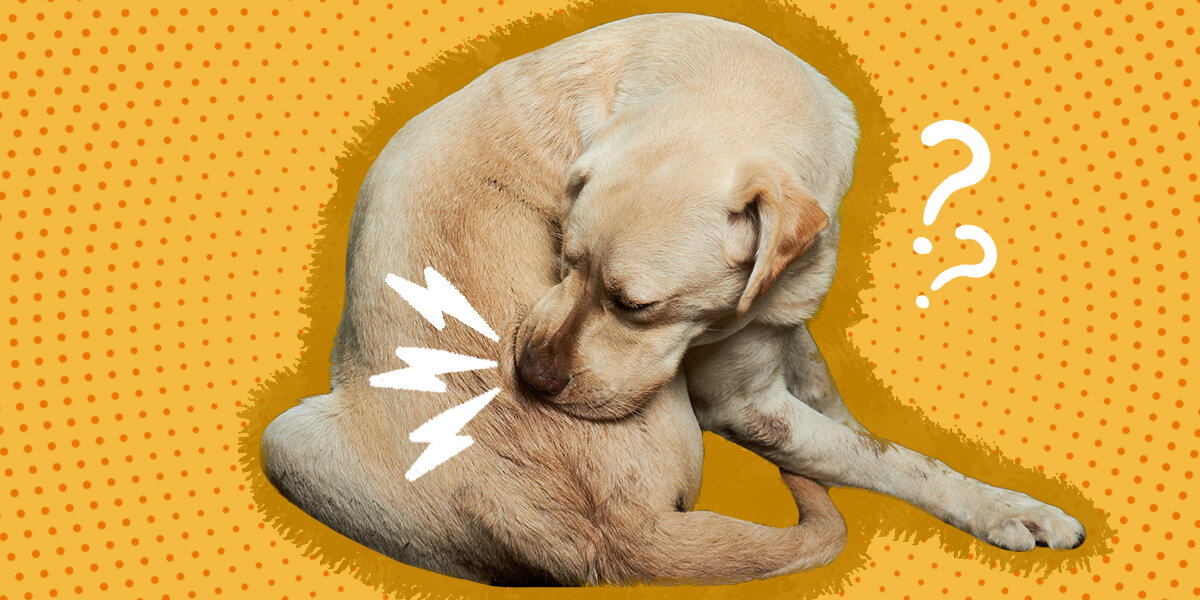Dogs can exhibit some strange behaviors, such as chewing their butts or biting their tails. But what exactly prompts them to do this? The truth is, there are several reasons why dogs may experience itchy butts, and thankfully, these issues are usually easily treatable with the help of a veterinarian.
If your dog is constantly chewing or licking his butt or tail area, there is likely an underlying reason behind it. According to Dr. Megan Moore, a veterinarian at Bergen County Veterinary Center, common causes of rectal itching in dogs include infected anal glands, intestinal parasites, skin infections, allergies, perianal fistulas, and more. Certain factors, such as being overweight, having loose stool or diarrhea, having allergies, or having specific breeds like German shepherds, can put dogs at a higher risk of developing rectal itching.
Infected Anal Glands
Dogs have anal glands located on either side of their hindquarters. These glands release a scent that helps them mark their territory and get to know other dogs. If these glands become full or infected, they can cause pain or itchiness for your dog. Signs that your dog may have full anal glands include chewing his tail or scooting across the floor. In such cases, it is important to have your vet express (essentially popping) the anal glands or teach you how to do it safely at home.
Parasites
Another common reason for dogs to chew their butts is the presence of parasites such as tapeworms, ticks, or fleas. In addition to the chewing behavior, other signs that your dog may have parasites include weight loss, vomiting, diarrhea, or the appearance of worms in their feces. To prevent parasites, it is crucial to keep your dog up to date on deworming medications and flea and tick preventative treatments.
Irritation and Infections
If your dog has a cut or irritation on his bottom, he may feel the need to itch. Fleas and ticks can also cause skin infections, itching, and hot spots. Therefore, it is important to keep an eye out for these symptoms and have your vet examine your dog for any signs of fleas or ticks.
Allergies
Itchy skin is one of the main symptoms of allergies in dogs. Allergies can be caused by various factors, including flea bites, pollen, and food. If you suspect that your dog is allergic to something, consult with your vet to identify the allergen. They can then prescribe allergy medication or help you eliminate the allergens from your dog’s environment.
Perianal Fistulas
Perianal fistulas are tunnels in the tissue and skin around a dog’s anal area and can appear as holes in the skin. Signs of perianal fistulas include pain, swelling, discharge, and difficulty defecating. While German shepherds are more prone to developing these fistulas, any breed can be affected. If you suspect your dog has a perianal fistula, consult with your vet for proper diagnosis and treatment.
Foreign Objects
Sometimes, dogs may itch their butt area if there is something stuck in or around it, such as dirt, poop, or grass. It is essential not to attempt to remove any objects yourself, as you could inadvertently harm your dog. Instead, have your vet safely remove any foreign objects.
Compulsive Disorders
In some cases, dogs may develop compulsive disorders that lead them to chew or itch their butt excessively. These disorders are often triggered by stress. To help alleviate stress, ensure your dog receives proper exercise, mental stimulation, and a calm environment. Severe cases may require prescription anxiety medication, so consult with your vet if you think your dog may benefit from such treatment.
Frequently Asked Questions
Q: When should I be concerned about my dog chewing his butt?
A: If the itching persists for more than 24 hours, your dog is obsessively licking or scooting, or you notice irritation, bleeding, malodor, lethargy, or other abnormalities, it’s time to visit your vet.
Q: How is the cause of rectal itching diagnosed?
A: A veterinarian will perform a rectal exam, express anal glands if necessary, conduct a skin examination, and screen for fecal parasites. Additional tests, such as biopsies, may be performed based on the initial findings.
Q: What are the treatment options for rectal itching in dogs?
A: The treatment plan depends on the underlying cause. It may include expressing anal glands, deworming medications, flea and tick preventatives, antibiotics for infections, allergy medication, or surgery for perianal fistulas.
Conclusion
If you notice your dog constantly chewing his butt, it is best to consult with your vet for a thorough examination. By identifying the underlying cause of the itching, your vet can develop an appropriate treatment plan. Remember, your dog’s comfort and well-being are important, and addressing any discomfort or unusual behavior promptly can lead to a happier and healthier furry friend.
Disclaimer: The views and opinions expressed in this article are those of the authors and do not necessarily reflect the official policy or position of Pawsoha. This article is for informational purposes only and is not a substitute for professional veterinary advice, diagnosis, or treatment. Contact a licensed veterinarian for personalized advice concerning your pet’s health.
